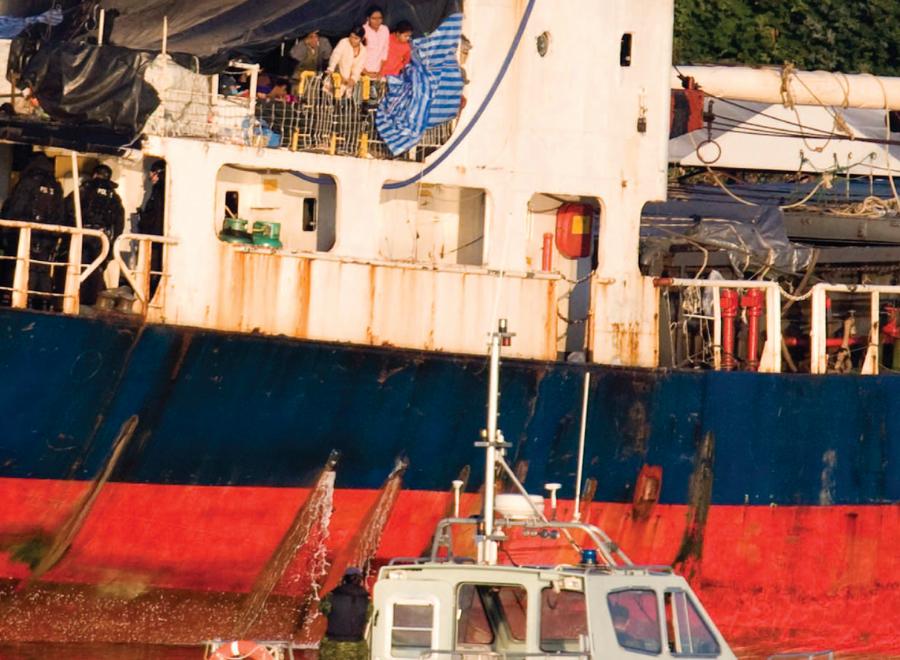Trudging through several feet of snow, wearing dress shoes and only a thin layer of clothing, Shahram Tabe realized that fleeing Iran wouldn’t be easy. The group of a dozen or so escapees travelled at night, led by a local villager. Sometimes they rode horses, but often the mountainous terrain along the border of Iran and Turkey was too steep or unstable and they’d have to walk. In the daytime, all of them crowded into a room in one of the small villages along the way and tried to get a few hours of sleep.
It was the winter of 1983 and Tabe was in his early 20s. Several years earlier, he had fought to overthrow Shah Mohammad Reza Pahlavi. Then, after the shah was ousted in 1979 and the Islamic republic led by Ayatollah Ruhollah Khomeini took over, he started speaking out against the new regime. He worked with women’s groups protesting being forced to wear the veil. He wrote articles in university papers about how the revolution had lost its way. When he became a television producer, he criticized the regime indirectly — running pieces on Pinochet’s rule in Chile, for example, which paralleled aspects of Iran’s new leadership.
But Khomeini’s regime wasn’t kind to its detractors. Dissidents could be sent to jail, tortured and even killed — the newspapers featured lists of people executed by the authorities. In early 1983, a close friend of Tabe’s — a fellow revolutionary who had stayed on with the government — told Tabe the secret police were coming for him. Tabe left the next day. “That was the best favour he did for me,” says Tabe. He found out later that several of their mutual friends were executed.
According to the United Nations’ convention on refugees, people fleeing persecution are excused for breaching immigration laws. It’s understood that sometimes one’s circumstances are so precarious, and the danger to life so great, that applying for a visa or even buying a plane ticket could have dire consequences. But those who enabled Tabe’s flight or that of other refugees are not excused from legal repercussions. On the contrary, human smugglers are vilified. And Canada is fighting for them and their networks to be stamped out.
“Human smuggling” sounds dirty. It conjures images of migrants being duped out of their life savings and forced into dangerous journeys or some type of modern slavery. But this is only part of the picture. Missing in the condemnation is the recognition of networks that can provide a vital service to people like Tabe fleeing persecution.
Last August, a boatload of 492 Tamil migrants arrived in British Columbia on the MV Sun Sea, the second Tamil migrant ship to land in less than a year. Two months later, the Conservative government introduced Bill C-49, an act to prevent human smugglers from abusing Canada’s immigration system. The proposed legislation would punish not only the smugglers but also those arriving without proper documentation. Although all opposition parties spoke out against the bill, which has yet to have a second reading in Parliament, the debate has tainted the image of refugees across the country and further demonized human smugglers.
So why does human smuggling have such a bad reputation? James Hathaway, a professor at the University of Michigan Law School and expert on international refugee law, believes it has been confused with the universally condemned practice of human trafficking. He points to the Conservative government’s language following the arrival of the Sun Sea. “The ease with which Harper moved back and forth between trafficking and smuggling was a thing to behold,” he says. “There was no evidence of trafficking; there was clear evidence of smuggling. But he turned it into something that was about exploiting people and really engaged the emotions of a lot of very good people.”
While human trafficking involves the exploitation of vulnerable migrants, human smuggling means helping people bypass border controls to get into a foreign country they do not have permission to enter. It could involve abuse and exploitation, but not necessarily. Some human smugglers, like Raoul Wallenberg — credited with helping thousands of Jews escape the Holocaust and posthumously made an honorary citizen of Canada — are revered. Often, human smugglers are the only hope for refugees anxious to flee their countries.
Despite the common belief that Canada is generous in its acceptance of refugees, it’s not easy for them to get here. Like most developed countries, Canada puts a lot of effort into blocking potential refugee claimants from arriving on its shores or at its airports. People from most refugee-producing countries must obtain a visa in order to travel here. To do that, they have to assure immigration officials that they are merely coming for a vacation, to work or to study.
“If visa officers think there’s any chance that a person might make a refugee claim in Canada, they have to deny them a visa,” says Mitchell Goldberg, an immigration and refugee lawyer in Montreal. “If someone goes to the Canadian embassy and says, ‘I’m afraid I’m going to be killed, and I need refugee protection,’ he will be refused.”
Some argue that those refugees who are brought here by a sponsor are the most deserving. But while the government sponsors over 7,000 refugees a year, and private groups such as the United Church sponsor another 3,000 to 5,000 or so, many more people languish in overseas refugee camps for years and even decades. If waiting doesn’t bring one any closer to a safe haven, however, education and language skills might. “When we go into refugee camps,” Hathaway explains, describing the government’s refugee selection process, “it’s not like we go, ‘Give us your tired, your desperate, your poor!’ We actually go in and say, ‘Look, that’s very nice that you might be shot because of your religion — but listen, do you have a degree in engineering?’”
With so many barriers to legal immigration, there is a market for those with the know-how to get desperate people to safety. Hathaway admits that human smuggling is not always a nice business, but for many people, it’s a necessary service.
The most ironic aspect of Canada’s push to tighten border controls and prevent human smuggling is that the harder it becomes to sneak into the country, the more attractive the industry becomes for organized criminal groups. The services of a human smuggler become more expensive, and those trying to cross borders without proper documentation are more vulnerable to trafficking as they rack up bigger debts to pay for those services. In our country’s effort to stamp out human smuggling, we are actually encouraging its most sinister form.
The man who smuggled Tabe out of Iran warned him to pack lightly and directed him to a northern border town where locals would assist in his journey. Armed with an overnight bag and a story about visiting his uncle, Tabe made it through several checkpoints where police grilled him on his reasons for heading north.
He spent almost a week trekking through mountains before finally reaching safer ground in Turkey. But soon after arriving, he realized he couldn’t stay long. If he were stopped by Turkish police, he’d be sent back to Iran. After a failed attempt to travel to Sweden, Tabe eventually made it to Canada by getting off a plane destined for Cuba when it stopped to refuel in Gander, N.L. He and several other Iranian escapees made a scene as they fought with the cabin crew to open the airplane door on the tarmac.
After years of delivering pizzas and driving taxis, he went back to school and is now a researcher with Ontario’s Ministry of the Environment. If he had tried to get out of Iran without help from human smugglers? “I wouldn’t be sitting here,” he answers. “I would be six feet under. There was no way to do the normal process.”
***
This story first appeared in The United Church Observer’s June 2011 issue with the title “In defence of human smuggling.”


Comments